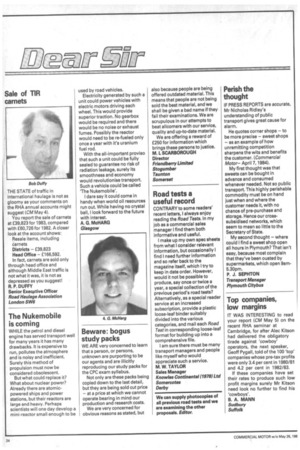Emi r Z ff Err
Page 26

If you've noticed an error in this article please click here to report it so we can fix it.
Sale of TIR carnets
THE STATE of traffic in international haulage is not as gloomy as your comments on the RHA annual accounts might suggest (CM May 4).
You report the sale of carnets at £39,823 for 1983, compared with £60,726 for 1982. A closer look at the account shows: Resale items, including carnets Districts — £39,823 Head Office — £166,592.
In fact, carnets are sold only through head office and although Middle East traffic is not what it was, it is not as depressed as you suggest! R. P. DUFFY Senior Executive Officer Road Haulage Association London SW6
The Nukemobile is coming
WHILE the petrol and diesel engine has served transport well for many years it has many drawbacks. It is expensive to run, pollutes the atmosphere and is noisy and inefficient. Surely this method of propulsion must now be considered obsolescent.
But what could replace it? What about nuclear power? Already there are atomicpowered ships and power stations, but their reactors are large and heavy. Perhaps scientists will one day develop a mini-reactor small enough to be used by road vehicles.
Electricity generated by such a unit could power vehicles with electric motors driving each wheel. This would provide superior traction. No gearbox would be required and there would be no noise or exhaust fumes. Possibly the reactor would need to be re-fueled only once a year with it's uranium fuel rod.
With the all-important proviso that such a unit could be fully sealed to guarantee no risk of radiation leakage, surely its smoothness and economy would revolutionise transport. Such a vehicle could be called 'The Nukemobile'.
I dare say it could come in handy when world oil resources run out. While having no crystal ball, I look forward to the future with interest.
A. G. McHARG Glasgow
Beware: bogus study packs
WE ARE very concerned to learn that a person, or persons, unknown are purporting to be our agents and are illicitly reproducing our study packs for the CPC exam syllabus.
Not only are these packs being copied down to the last detail, but they are being sold cut price — at a price at which we cannot operate bearing in mind our production and research costs.
We are very concerned for obvious reasons as stated, but also because people are being offered outdated material. This means that people are not being sold the best material, and we shall be given a bad name if they fail their examinations. We are scrupulous in our attempts to beat allcomers with our service, quality and up-to-date material.
We are offering a reward of £250 for information which brings these persons to justice. M. L SCARBOROUGH Director Friendberry Limited Stogumber Taunton Somerset
Road tests a useful record
CONTRARY to some readers' recent letters, I always enjoy reading the Road Tests. In my job as a commercial sales manager I find them both informative and useful.
I make up my own spec sheets from what I consider relevant information, but occasionally I find I need further information and so refer back to the magazine itself, which I try to keep in date order. However, would it not be possible to produce, say once or twice a year, a special collection of the previous period's road tests? Alternatively, as a special reader service at an increased subscription, provide a plastic loose-leaf binder suitably divided into the various categories, and mail each Road Test in corresponding loose-leaf format for building up into a comprehensive file.
I am sure there must be many transport managers and people like myself who would appreciate such a service. M. W. TAYLOR Sales Manager Knowles Continental (1978) Ltd Somercotes Derby
We can supply photocopies of all previous road tests and we are examining the other proposals. Editor.
Perish the thought
IF PRESS REPORTS are accurate, Mr Nicholas Ridley's understanding of public transport gives great cause for alarm.
He quotes corner shops — to be more precise — sweet shops — as an example of how unremitting competition sharpens the wits and benefits the customer. (Commercial Motor— April 7, 1984).
My first thought was that sweets can be bought in advance and consumed whenever needed. Not so public transport. This highly perishable commodity must be on hand just when and where the customer needs it, with no chance of pre-purchase and storage. Hence our crosssubsidised networks, which seem to mean so little to the Secretary of State.
My second thought — where could I find a sweet shop open all hours in Plymouth? That isn't easy, because most complain that they've been ousted by supermarkets, which open 9am5.30pm.
P. J. SEPHTON Transport Manager Plymouth Citybus
Top companies, low margins
IT WAS INTERESTING to read your report (CM May 5) on the recent RHA seminar at Cambridge, for after Alec Kitson had delivered the obligatory tirade against 'cowboy' operators, the next speaker, Geoff Pygall, told of the 100 'top' companies whose pre-tax profits were only 3.4 per cent in 1980/81 and 4.2 per cent in 1982/83.
If these companies have set their rates to produce such low profit margins surely Mr Kitson need look no further to find his 'cowboys'.
B. A. MANN
Sudbury
Suffolk








































































































